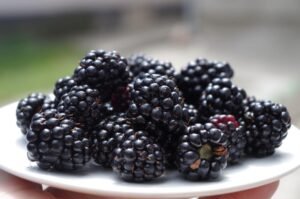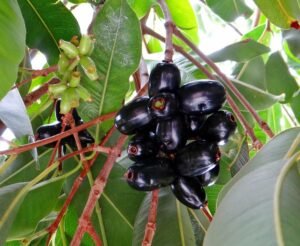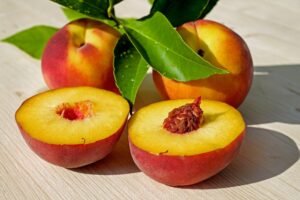The rainy season in India lasts from June to September with the coming of the rainy season there are also many different rainy season fruits in India that are on the market. The rainy season is one of the best seasons to enjoy different types of fruits. This season might be hated by some for its hassle and humid environment but from the fruit’s season point of view, it’s rich for its varied types of the fruit variety. Let’s take a look at some of the most loved rainy season fruits in India:
Table of Contents
Pears-A Rainy Season Fruits
Pears are one of the richest sources of vitamin C, K, folate and potassium. It is one of the rainy season fruits.They are rich in soluble and insoluble fibres which promote gut health. They are packed with vitamins and minerals like copper that help combat inflammation and ultimately decrease your risk of heart disease if taken in sufficient amounts.
A medium-sized pear weighing around 178 gms has the following nutritional value:
-101 calories
-0.285 g fat
-0.67 g of protein
-26.9 g of carbohydrates of which 17.2 g of sugar and 5.5 g of fibre.

Mango
Favourite of many, Mango is one of the most loved and celebrated monsoon season fruit in India.It is one of the rainy season fruits. It is famously called the “Kings of all fruits”. Apart from being known for its large number of varieties, it is also rich in nutritional value. During this monsoon season fruit is rich in vitamin C, copper, folate and vitamin B6 One cup of freshly diced mango (165g) has the following nutritional value:
99 calories
24.7 g carbohydrates
1.4 g Protein
22.5 g sugar

Blackberries
In the list of rainy seasonal fruits in India blackberry is one of the healthiest, packed with nutrients and tastiest amongst all fruits. It is one of the rainy season fruits. It can be taken in breakfast along with greek yoghurt or can be made into a yummy smoothie without adding sugar. They also work well in desserts including pie or crumble. It is a rich source of fibre, vitamins and k. 100 g serving of blackberries provides:
14% of RDA of Fibre
35% of RDA of Vitamin C
Packed with antioxidants, and Vitamin A and keeps skin and teeth healthy.

Jamun
Jamun also called “Indian Blackberry” is famous not only for its taste but also for its importance in medicine. It has been in use since ancient times in ayurvedic medicines. It is rich in antioxidants, Phosphorous and flavonoids.It is one of the rainy season fruits. It helps, in increasing the haemoglobin content as it is loaded with iron and vitamin C, and keeps the heart healthy by regulating cholesterol, It is rich in vitamin A and C which toxifies blood and eventually keeps the gut healthy.
Jamun is a low-calorie fruit with high fibre content and is ideal in weight regulation diets and recipes. It toxifies blood leaving radiant, glowing skin.

Peach
This stone fruit is filled with the goodness of nutrients and is available as the rainy seasonal fruit in India. Filled with nutrients of vitamins, minerals and antioxidants.It is one of the rainy season fruits. It is good for the skin and keeps your skin healthy by retaining water in your skin. It contains carotenoids and caffeine acid which are known to be anti-cancer compounds.
It may lower your heart risk factors by lowering blood cholesterol levels and also aid in good gut health. A medium-sized peach(145 g ) provides the following nutrients:
58Calories
1 g protein
Less than 1 g of fat
14 g carbohydrates
17% DV of vitamin C
10% DV of Vitamin A

Plum
In the same family as that peaches, and apricots these fleshy stone fruit not just has a bright colour but also provides several health benefits. They are available in varied colours including purple, red, orange and yellow.It is one of the rainy season fruits. It is the second most cultivated fruit in the world. Though it is a monsoon season fruit in India, it remains available till early October in many parts.
-It helps in controlling blood pressure.
-It helps in your weight loss journey.
-Ideal snack as it contains only 30 calories.
-It may increase your bone density in addition to other Vitamin D supplements.
-Booth heart health and reduce heart risks

For more articles related to food, kindly refer to the Food section.
Author Ashish Rawat

VIP345APK… Sounds like an app download. Anyone know if it’s safe and legit? What are the perks of vip345apk?